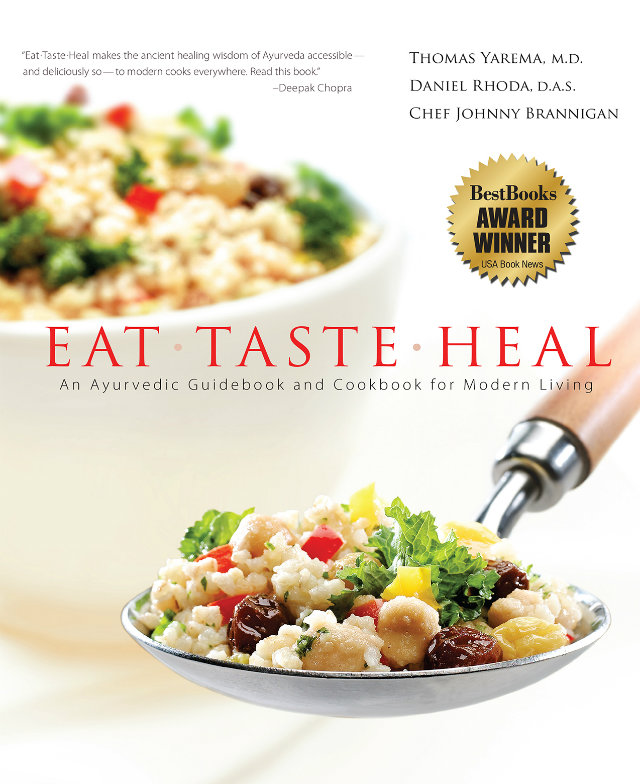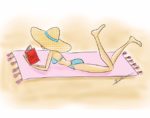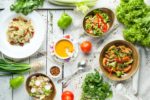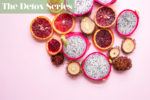
Eat, Taste, Heal an Ayurvedic guidebook and cookbook for modern living
This book is an excellent guide to Ayurvedic philosophy of health and nutrition and includes many delicious recipes.
If you liked Eat, Pray, Love ….here’s the back story. Eat, Taste, Heal is an excellent guide to Ayurvedic philosophy of health and nutrition and includes many delicious recipes.
Three authors contribute to the book’s authenticity and credibility. Disillusioned with western medicine, Thomas Yarema, former emergency medicine doctor, founded a holistic medical practice in Hawaii; Daniel Rhoda, an investment banker, turned to Ayurvedic medicine after severe arthritis left him wheelchair-bound; and Johnny Brannigan, Ayurvedic chef, studied transcendental meditation with Maharishi Mahesh Yogi.
Before dismissing this philosophy as mysticism or magic, consider the facts. Ayurveda philosophy derives from the Vedas (India), the world’s oldest literature. Early Vedic scholars conducted scientific experiments to test their beliefs. In India, while western medicine is practiced in hospitals, Ayurvedic medicine is an accepted, popular alternative.
Core beliefs include:
• An inseparable connection between mind and body;
• “Health, not illness, is our natural state.”
• Love is healing…
This unique holistic approach to nutrition and wellness defines:
• Six distinct tastes, all of which should be included in each daily meal.
• Three doshas: vata, pitta, or kapha, deriving from five elements, govern our physical and mental processes. Doshas explain our constitutional differences and susceptibility to particular diseases.
• Seven disease stages. The disease process can be reversed by nutritional choices.
The goal of nutrition is to promote vitality and a healthy immune system.
According to the writers, nearly 2/3’s of all food in US supermarkets is genetically modified, a practice banned by 30 countries in Europe and Asia.
While not strictly vegetarian, Ayurvedic practitioners recommend eating organic, particularly fresh fruits and vegetables. Avoid genetically reengineered food and processed foods. According to the writers, nearly 2/3’s of all food in US supermarkets is genetically modified, a practice banned by 30 countries in Europe and Asia.
Practitioners consider breath an essential bridge that links body, mind, and spirit. The book includes instructions on deep breathing and other meditation techniques, and the scientifically-proven health benefits, i.e. to promote “positive emotions and immunity, [and reduce] anxiety, blood pressure, cholesterol, and muscular tension.”
This beautiful book offers nutritional remedies for a host of ailments, including colds, low libido, menopause and insomnia, as well as 150 pages of delicious recipes.
This beautiful book offers nutritional remedies for a host of ailments, including colds, low libido, menopause and insomnia, as well as 150 pages of delicious recipes, tailored specifically to your “dosha.”
Ayurvedic cooking makes extensive use of colorful herbs and spices like cardamom, ginger, basil, and thyme. The recipes included offer something for every palate (and dosha) including delicious couscous milk pudding, spiced oatmeal, warm almond milk, lentil salad, chutneys, cornbreads, and mango mandarin sorbet.
Not just a recipe for good nutrition, the book’s also a recipe for healthy living.
By Thomas Yarema, M.D.; Daniel Rhoda, D.A.S.; Chef Johnny Brannigan
About the Author Daniel Rhoda (In Memoriam)
The co-author of this best selling book on the art of Ayurvedic healing and holistic living, Daniel Patrick Rhoda, MA, graduated summa cum laude from Bowdoin College in 1999 after completing a junior year of college at the London School of Economics.
He earned a Master of Arts in Transpersonal Psychology from the Institute of Transpersonal Psychology in Palo Alto, CA, in 2011.
His departure in 2013, was the loss of a bright light.





